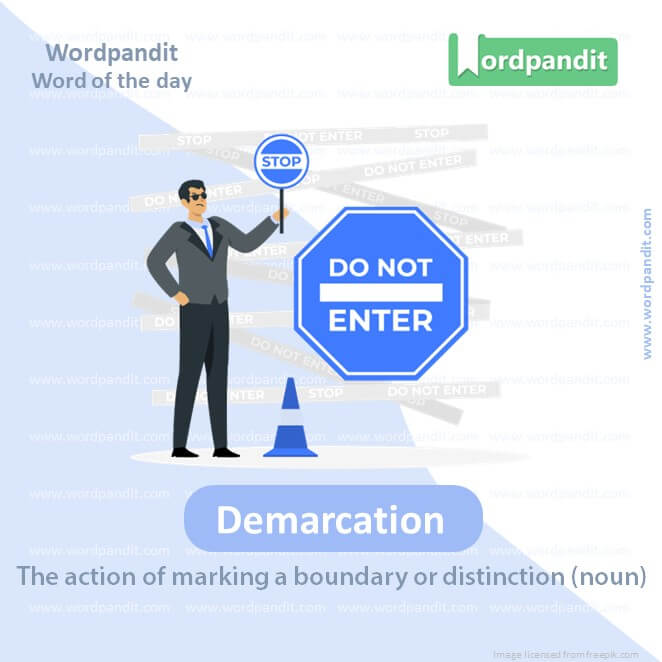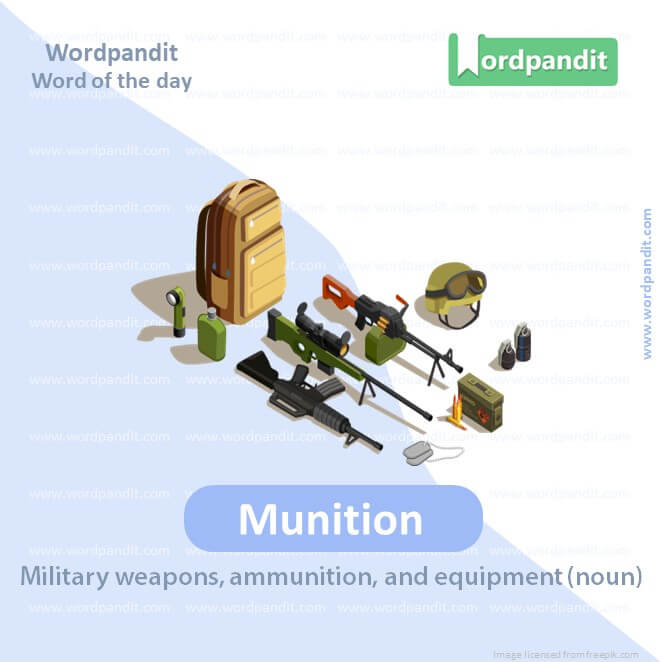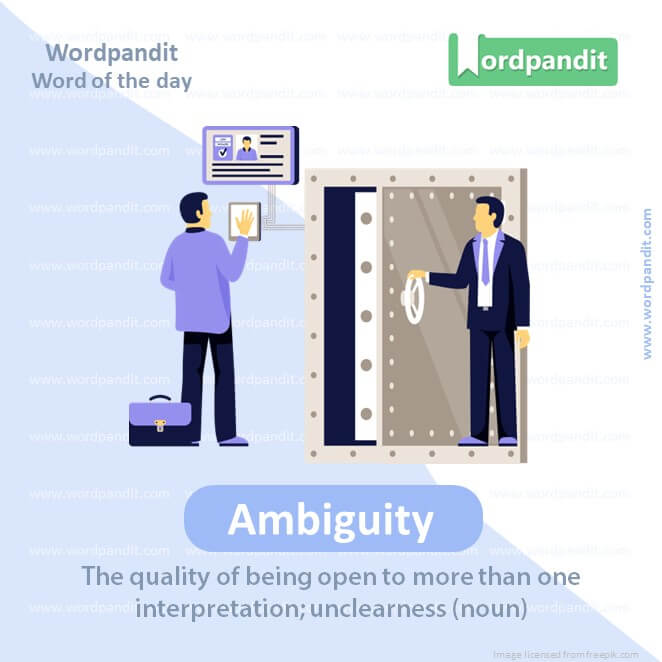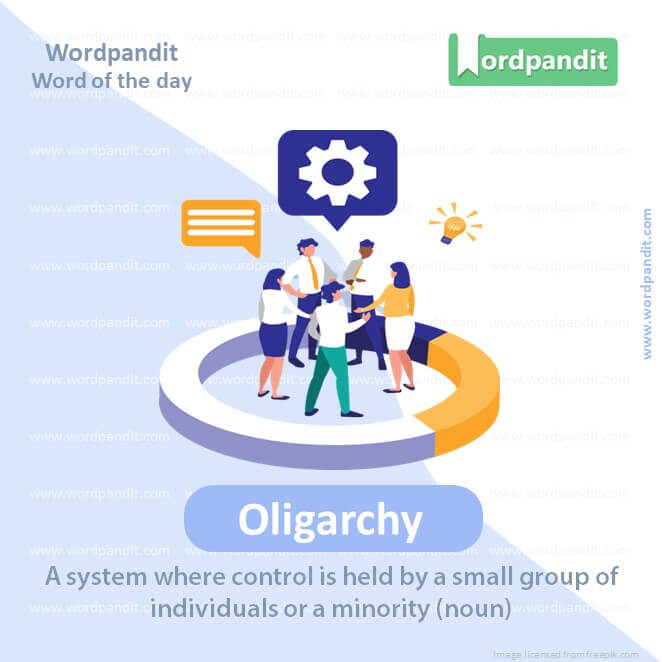Daily Vocabulary Words: List of Daily Used Words
Hi there. Welcome to this special section @ Wordpandit.
Our endeavour here is straightforward: highlighting important daily vocabulary words, you would encounter in The Hindu. This is your repository of commonly used words; essentially, we are posting a list of daily used words. Hence, this has significant practical application as it teaches you words that are commonly used in a leading publication such as The Hindu.
Visit the website daily to learn words from The Hindu.

WORD-1: Demarcation
CONTEXT: The two countries were inching towards the completion of a three-step road map on boundary delineation and demarcation.
SOURCE: The Hindu
EXPLANATORY PARAGRAPH: Imagine you and your sibling want to share a room, so you draw a line with chalk to show whose side is whose. This line helps you know which space belongs to whom. “Demarcation” is just a fancy word for drawing that line or making a boundary.
MEANING: The action of marking a boundary or distinction (noun).
PRONUNCIATION: deemarKAYshun
SYNONYMS: Boundary, division, delimiter, distinction, separation, borderline
USAGE EXAMPLES:
1. The river serves as a natural demarcation between the two countries.
2. The demarcation of responsibilities ensured no overlapping of tasks.
3. New signs were put up for the demarcation of the pedestrian zone.
4. There’s a clear demarcation between the two ecosystems in the forest.

WORD-2: Acquiescence
CONTEXT: India’s interests are better served by taking Bhutan on board and aligning strategies rather than by expecting acquiescence from a sovereign nation that will understandably pursue its own.
SOURCE: The Hindu
EXPLANATORY PARAGRAPH: Sometimes when your friend wants to play a game you don’t really like, you might just say “Okay, let’s play” without arguing. This is because you want to be nice and keep the peace. “Acquiescence” means quietly agreeing or accepting something without protest.
MEANING: Passive acceptance or submission without protest (noun).
PRONUNCIATION: akweeESens
SYNONYMS: Compliance, consent, agreement, assent, concession, acceptance
USAGE EXAMPLES:
1. She nodded in acquiescence and followed him out.
2. His silence was taken as acquiescence to the plan.
3. The employees showed acquiescence to the new policy.
4. Through sheer acquiescence, he allowed the changes to be made.

WORD-3: Munition
CONTEXT: Article 1 of this protocol defines an “incendiary weapon” as a weapon or munition primarily designed to set fire to objects or to cause burn injury to persons through the action of flame.
SOURCE: The Hindu
EXPLANATORY PARAGRAPH: Think of superheroes with tools or weapons to help them fight villains. “Munition” is like those tools or weapons, but for soldiers or armies to use in battles.
MEANING: Military weapons, ammunition, and equipment (noun).
PRONUNCIATION: myooNIshun
SYNONYMS: Ammunition, arsenal, armament, weaponry, ordnance, materiel
USAGE EXAMPLES:
1. The army base stored munition for emergencies.
2. They increased the production of munition during the war.
3. The rebel group was accused of smuggling munition.
4. Without adequate munition, the soldiers were at a disadvantage.

WORD-4: Ambiguity
CONTEXT: Removing ambiguity in Protocol III would also facilitate enforcement because with clearer rules, violations will become more easily identifiable.
SOURCE: The Hindu
EXPLANATORY PARAGRAPH: You know when you hear a riddle or a joke, and it can have more than one answer or meaning, and it makes you scratch your head a bit? That’s because it’s “ambiguous”. “Ambiguity” is the word we use when something can be understood in more than one way and it’s not clear which way is right.
MEANING: The quality of being open to more than one interpretation; unclearness (noun).
PRONUNCIATION: ambigYOOitee
SYNONYMS: Vagueness, uncertainty, indefiniteness, obscurity, doubtfulness
USAGE EXAMPLES:
1. The ambiguity of the question led to varied answers.
2. His statement was filled with ambiguity, leaving everyone confused.
3. The author enjoys using ambiguity to make readers think.
4. They wanted to remove any ambiguity from the contract.

WORD-5: Oligarchy
CONTEXT: it could protect Poland’s traditional values and its independence from the European oligarchy.
SOURCE: The Hindu
EXPLANATORY PARAGRAPH: Imagine if only a few kids in the class got to decide everything, like the games to play or stories to read. “Oligarchy” is when just a small group of people have all the power and control in a country or organization.
MEANING: A system where control is held by a small group of individuals or a minority (noun).
PRONUNCIATION: OLLigarkee
SYNONYMS: Ruling elite, privileged class, dominant group, the few, aristocracy
USAGE EXAMPLES:
1. The nation was ruled by an oligarchy of wealthy businessmen.
2. Critics argued that the political system was turning into an oligarchy.
3. The ancient citystate was governed by an oligarchy.
4. The family maintained an oligarchy, controlling the town for generations.
WORD-6: Exacerbated
CONTEXT: This situation is particularly challenging in a city that is already grappling with congestion issues, exacerbated by ongoing Metro construction projects.
SOURCE: The Hindu
EXPLANATORY PARAGRAPH: Think of having a small scratch and then you keep scratching it until it becomes a big, red mark. “Exacerbated” means to make something worse than it already is.
MEANING: To make a bad situation or problem worse (verb).
PRONUNCIATION: exASerbayted
SYNONYMS: Aggravated, intensified, worsened, inflamed, heightened
USAGE EXAMPLES:
1. His lack of sleep exacerbated his bad mood.
2. Pollution has exacerbated the environmental crisis.
3. Their argument was exacerbated by their previous disagreements.
4. Ignoring the issue only exacerbated the problem.
WORD-7: Litigations
CONTEXT: BMRCL has been saying that challenges related to land acquisitions and public interest litigations have been the primary obstacles.
SOURCE: The Hindu
EXPLANATORY PARAGRAPH: Have you ever seen people in court on TV, arguing and trying to solve a problem with the help of a judge? That’s because they’re involved in a “litigation”. It’s like a serious grownup way of solving disagreements with the help of laws.
MEANING: The process of taking legal action; a lawsuit (noun).
PRONUNCIATION: litiGAYshuns
SYNONYMS: Lawsuit, legal action, legal dispute, legal proceedings, legal contest
USAGE EXAMPLES:
1. The company is currently involved in several litigations.
2. The construction project was delayed because of litigations.
3. They decided to settle the matter outside of litigation.
4. Rising litigations have made businesses more cautious.
WORD-8: Magnanimous
CONTEXT: People who knew him spoke of his magnanimous and selfless character.
SOURCE: The Hindu
EXPLANATORY PARAGRAPH: Imagine a friend who shares their biggest piece of candy with you even though you accidentally broke their toy. That’s because they’re being “magnanimous”. It’s a way of being really kind and generous, especially when you have a reason not to be.
MEANING: Showing a generous and kind nature, especially after a dispute or when one has a reason to be upset (adjective).
PRONUNCIATION: magNANimous
SYNONYMS: Generous, bighearted, gracious, noble, forgiving
USAGE EXAMPLES:
1. Even after the argument, she was magnanimous enough to apologize first.
2. The magnanimous donor contributed a large sum to the charity.
3. It was magnanimous of him to forgive the mistake and move on.
4. The team’s captain was magnanimous in victory, praising the losing side.
WORD-9: Acclimatise
CONTEXT: we had to acclimatise ourselves for 48 hours at Leh, at an altitude of 3,500 m, before climbing up to Hanle.
SOURCE: The Hindu
EXPLANATORY PARAGRAPH: Imagine moving from a really hot place to a very cold place. At first, you might feel really cold, but after some time, you get used to it. That process of getting used to a new situation or environment is called “acclimatising”.
MEANING: To get used to a new environment or different conditions (verb).
PRONUNCIATION: akLImuhtize
SYNONYMS: Adapt, adjust, acclimate, habituate, attune
USAGE EXAMPLES:
1. It took her a few weeks to acclimatise to the high altitude of the mountains.
2. The animals were given time to acclimatise to their new habitat.
3. When moving to a different country, it’s essential to acclimatise to the local culture.
4. They set up early base camps to help mountaineers acclimatise.
WORD-10: Astrotourism
CONTEXT: these dark skies to promote astrotourism as a means to further enhance socio-economic development in the area.
SOURCE: The Hindu
EXPLANATORY PARAGRAPH: Have you ever looked at the stars at night and felt amazed? “Astrotourism” is when people travel to places where they can see the stars, planets, and other cool stuff in the sky really clearly, away from the city lights.
MEANING: Tourism focused on stargazing and other celestial events (noun).
PRONUNCIATION: AStroTOURizm
SYNONYMS: Star tourism, space tourism, celestial tourism, night sky tourism, astronomical tourism
USAGE EXAMPLES:
1. The desert is a popular location for astrotourism because of its clear skies.
2. With the growth of astrotourism, more observatories are opening to the public.
3. Astrotourism offers an escape from the bright lights of the city.
4. They booked a cabin in the mountains, hoping to experience astrotourism.
Vocabulary
Language is a confluence of thoughts, emotions, and experiences that find vibrant expression through words. In this spectrum, ‘vocabulary’ shines as a critical aspect that shapes and directs our language proficiency. It offers depth, nuance, and clarity to our expressions. However, mastering ‘vocabulary’ is an art that requires a strategized approach.
An intensive strategy for learning ‘vocabulary’ goes beyond the limiting precincts of memorization. Instead, it nudges learners towards comprehension and application. To understand ‘vocabulary’, take a step forward from traditional textbooks and classroom sessions, and embrace the vast world of books, articles, podcasts or digital content in the language you are learning. This step allows you to understand words in context, see how they are used in different situations, and absorb words as part of the natural flow of language.
As you journey through ‘vocabulary’, remember that this expedition should not be a race. Rather, it’s a marathon where pacing yourself is pivotal to long-term success. Learning a few words each day and consolidating your knowledge through regular revision tends to be more effective, as it prevents cognitive overload and promotes solid retention.
Interactive learning tools can provide valuable support in assimilating ‘vocabulary’. Use of flashcards, language-learning apps, or memory-enhancing software can make this process more engaging and effective, reinforcing the ‘vocabulary’ in your memory.
Lastly, practice is an incontrovertible part of mastering ‘vocabulary’. Utilize the learnt vocabulary in your daily conversations, write-ups, or presentations to ensure an active application. Doing this fosters recall and cements understanding.
In summation, learning ‘vocabulary’ is a journey that should be embraced with an integrated approach, where understanding and application are the key elements. By engaging with diverse learning resources, pacing the learning process, employing interactive learning tools, and practicing regularly, the journey of mastering ‘vocabulary’ becomes a fulfilling and enriching experience.







